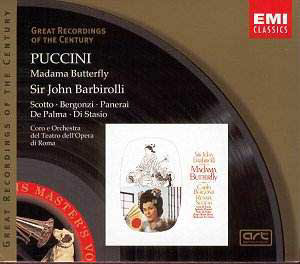After his long association with the Hallé and
New York Orchestras, it was a shock to some when the then 67 year-old
maestro Barbirolli, JB as he was known, was chosen for this major recording.
Those who knew of his distinguished work at Covent Garden and other
opera houses in the pre-war years would have been less so. There was
perhaps another agenda. The Rome orchestra was getting sloppy and stroppy.
I well remember JB returning from the sessions describing how on the
first morning he had brought them to heel with a mixture of 'colloquial'
Italian combined with a glare that could set fire to a score at twenty
paces! There was more to it than that of course. Barbirolli knew and
loved this music and the orchestra soon realised this. They came to
know and love this small man and gave him one of their best performances
in years. The whole glows with joint commitment.
Right from the start the performance exudes quality
singing from its all-Italian cast. Track 1 introduces the elegant phrasing
and golden tones of Carlo Bergonzi as the caddish Pinkerton and the
unwavering steady voice of Piero de Paima as Goro the marriage broker;
the ultimate comprimario, in a part so often given to a reedy unsteady
voice. Track 2 brings the creamy tones of Anna di Stasio's Suzuki, and
tr 5 the nut brown perfectly centred voice of Panerai as the luckless
Sharpless who, ultimately, has to pick up the pieces. Track 6 heralds
the arrival of Butterfly. Scotto's full tone and voice at this point
poses the question, 'will she sound too old for a supposed 15 year old',
as Tebaldi does (on Double Decca), also with, Bergonzi and tastefully
conducted by Serafin. In the succeeding exchanges with Pinkerton, she
adopts a lighter more girlish tone as she introduces her possessions
and the 'marriage' ceremony is concluded.
The arrival of the Bonze of Paolo Montarsolo continues
the quality idiomatic voices (tr 12), and further highlights what has
been evident from the opening chords, JB’s grasp of the nuances of the
score. His pacing is in no way rushed nor is it as laggardly, or over
indulgent, as Karajan (Decca, 3 discs at full price). His use of rubato,
combined with the shaping of the phrases and shading of the dynamics,
results in an all encompassing emotional effect. The orchestra, as indicated,
play superbly for their new maestro, whilst the Italian choir bring
their particular 'squilla' to the singing of their own language.
The recording wears its age well. Whilst it lacks a
little of the natural warmth and presence of the best modern recordings
it is lucid and well balanced and set in a clear acoustic. Given the
excellent diction of the singers it is a pleasure to follow the libretto,
which is provided with English, French and German translations. There
is also a useful track related synopsis and photographs from the sessions.
Given the foregoing one has to wonder why this performance
has had such a varied career on CD, before being given the accolade,
justifiable in my view, of inclusion in this 'Series'. The answer lies,
I think, in the
response to the singing of Scotto who sometimes over-characterises
the girlishness of Butterfly and has the odd raw note at the top of
her voice when under pressure. The upside of her interpretation however,
is, that she lives and breathes all of Butterfly's many emotions leaving
the involved listener 'gutted' at her final tragedy. Whereas Bergonzi
and Panerai can stand comparison with any other on disc, Freni, for
Karajan, is the perfect Butterfly, balancing legato and subtle characterisation
with a wide palate of tonal colour. However, as a total 'package' this
Butterfly takes a lot of beating and is justifiably a 'GROC'.
Robert J Farr


